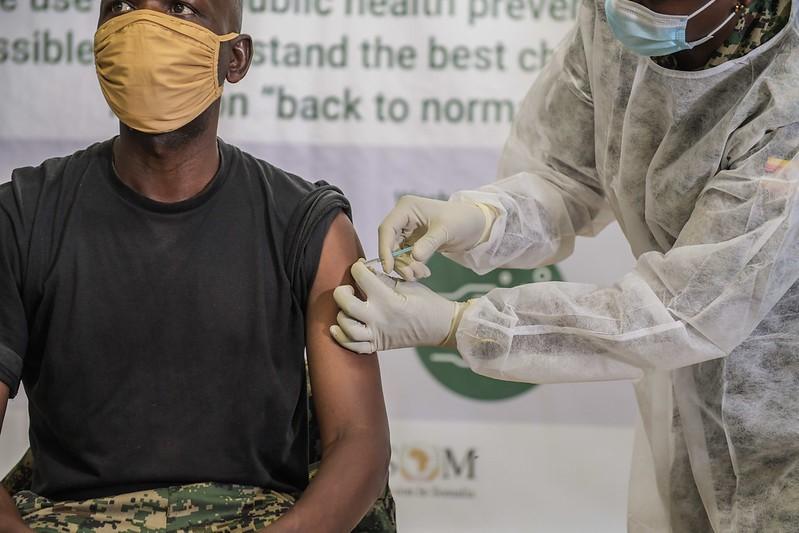In some of the first real-world findings on Omicron's impact in South Africa, researchers found a drop in Pfizer vaccine effectiveness against hospitalization, but also a drop in hospitalizations, another early hint that infections might be less severe.
However, World Health Organization (WHO) officials today aired worries that countries are dismissing the Omicron (B.1.1.529) variant as mild and are relying too much on vaccines to blunt expected surges.
WHO: Omicron spreads unlike any other variant
Tedros Adhanom Ghebreyesus, PhD, the WHO's director-general, said Omicron is spreading at a rate not seen with any previous variant, and officials are concerned that people are dismissing Omicron as mild. He said so far, the variant has been detected in 77 countries, and is probably in most, even if it hasn't been detected yet.
The world should already know not to underestimate SARS-CoV-2, Tedros said. "Even if Omicron does cause less severe disease, the sheer number of cases could once again overwhelm unprepared health systems."
WHO officials also said vaccines alone won't get countries out of the crisis.
Mike Ryan, MD, who leads the WHO's health emergencies program, said, "This is a highly transmissible virus. It's hard to stop it—but you can take the heat out of the virus by doing the simple things." He urged people to wear masks, ensure good ventilation, and wash their hands. And he urged governments to enact layered measures that support communities and to get health systems ready.
Tedros said vaccines have the greatest impact if they target those at most risk. He said the WHO isn't against booster shots, but he said the order matters. Giving them to people at low risk endangers those at high risk who are still waiting for their primary doses, Tedros said, adding that giving additional doses to those at high risk can save more lives than giving primary doses to those at low risk. "Our main concern is to save lives everywhere," he said.
Early vaccine effectiveness data
Earlier lab-based studies found a drop in neutralization, suggesting but not proving a drop in vaccine protection from the Omicron variant. Health officials have been eager to see real-world experiences, especially from South Africa, the country hit first by the new variant.
The South African research study covers the first 3 weeks of the Omicron outbreak in Gauteng province and was posted online in a preprint study from a team at Discovery Health, the country's largest insurer. They analyzed 211,000 PCR-positive test results from adults ages 18 and up, 41% of whom had received two doses of Pfizer-BioNTech COVID-19 vaccine.
Those who received two Pfizer doses were 70% less likely to be hospitalized, significantly lower than the 93% protection seen in South Africa's Delta (B1617.2) variant wave. Protection was slightly lower in the oldest age groups.
Regarding hospitalizations in general, the group said those infected with Omicron were 29% less likely to be hospitalized, compared to waves involving other variants. In a statement, Ryan Noach, MD, Discovery Health's chief executive officer, said the flatter trajectory of hospital admission in the Omicron wave that hints at lower severity could be confounded by high seroprevalence in South Africa's population, especially after its Delta wave.
More global headlines
- The WHO's African regional office today said Omicron and Delta activity have resulted in an 83% increase in cases over the past week, though deaths aren't tracking as high as earlier surges and were down 19%. It added that cases are doubling every 5 days, the shortest period reported this year. Though South Africa's hospitalizations rose 67% in the past week, intensive care unit (ICU) occupancy remains low at 7.5%, with 14% of hospitalized patients needing oxygen.
- Treatment options with monoclonal antibodies might be limited if the Omicron variant becomes dominant, two German research groups reported today in preprint studies, according to Reuters. In lab-based studies, they found that the sotromovimab, from GlaxoSmithKline and Vir Biotechnology, had good neutralizing activity against Omicron. However, monoclonal antibody combinations from Regeneron (casirivimab and imdevimab) and Eli Lilly (bamlanivimab and etesevimab) lost most of their activity.
- China is battling COVID-19 outbreaks in Zhejiang province, one of the country's major manufacturing hubs. The province has reported 173 cases in its latest outbreak, which is affecting three cities: Ningbo, Shaoxing, and Hangzhou. At least 12 companies have suspended production in Zhejiang province due to COVID-19 measures.
- In the Netherlands, schools started Christmas break early to reduce the spread of COVID-19.
- Denmark, with rising Omicron cases, reported a record daily high of 8,314 cases today.
- The global Omicron total has risen to 8,826 cases from 75 countries, the European Centre for Disease Prevention and Control (ECDC) said in its daily update. Of case in Europe, 70% were locally acquired, and of those, 45% were identified during outbreak investigations.
- The overall COVID-19 total today rose to 271,325,984 cases, and 5,318,661 people have died from their infections, according to the Johns Hopkins online dashboard.





















